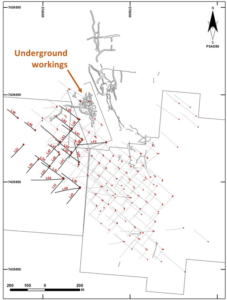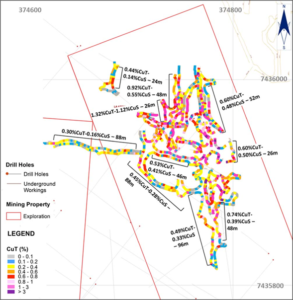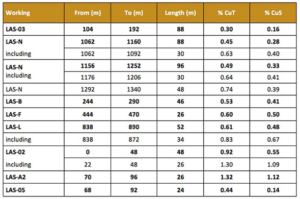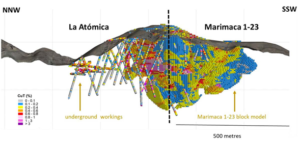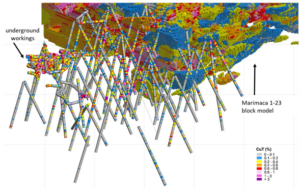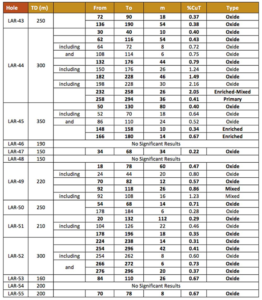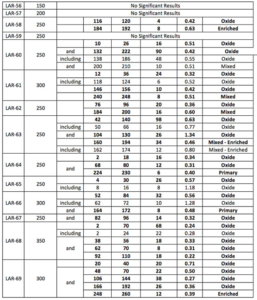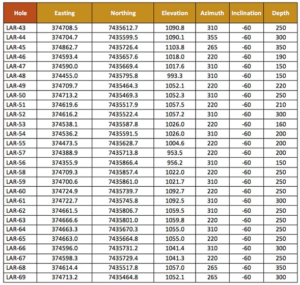La Atómica Drilling and Underground Sampling Results Highlighted by 98 metres at 0.64%CuT
January 16, 2019
Vancouver, British Columbia, January 16, 2019 – Marimaca Copper Corp. (“Coro” or the “Company”) (TSX: COP) is pleased to announce an update at the Company’s Marimaca project in the Antofagasta region of Chile. At La Atómica, the area that was acquired after Marimaca 1-23, drilling has been completed and confirms the continuation of copper oxide mineralization to the northwest.
Highlights
- Results from 27 of the 64 RC drill holes completed, including 9 more holes than originally planned, for 6,530 metres of a total 15,100 metres, drilled on a 100 x100 metre grid. Highlights include:
Hole LAR 44
-
- o From 132 to 176 metres, 44 metres of copper oxide mineralization averaging 0.79% CuT, including 26 metres, from 150 to 176 metres, averaging 1.49% CuT.
- From 182 to 228 metres, 46 metres of copper oxide mineralization averaging 1.49 %CuT, including 30 metres, from 198 to 228 metres, averaging 2.16% CuT.
- From 232 to 258 metres, 26 metres of mixed copper oxide chalcocite mineralization averaging 2.05% CuT
Hole LAR 63
-
- From 42 to 140 metres, 98 metres of copper oxide mineralization averaging 0.63% CuT.
- From 104 to 130 metres, 26 metres of copper oxide mineralization averaging 1.34% CuT.
Hole LAR 66
-
- From 52 to 84 metres s, 32 metres of copper oxide mineralization averaging 0.56 %CuT, including 10 metres, from 62 to 72 metres, averaging 1.28 %CuT.
- A total of 2,648 metres of chip channel samples has been collected from underground workings, averaging 0.66% CuT, with highlights including:
- 96 metres at 0.49% CuT
- 46 metres at 0.53% CuT
- 52 metres at 0.61% CuT
- 48 metres at 0.92% CuT
- 26 metres at 1.32% CuT
- Current work suggests total horizontal extension of the outcropping copper oxide mineralization from Marimaca to La Atómica now reaches 800 metres in a north-west direction, however, this could extend further.
- Drilling program was expanded to confirm copper oxide mineralization towards the southwestern part of the La Atómica property, with an additional 9 holes for 2,120 metres have been drilled with assay results pending.
Further Information
Figure 1 below illustrates the location of the completed Phase I drilling which established the resource at Marimaca 1-23 and the Phase II drill holes at La Atómica. The location of the underground workings at La Atómica is also shown. It is worth noting that due to the designed 100 x 100 metre grid spacing, just a few holes intercepted the underground working area. Included below are tables showing the drill intercepts and a drill hole collar location data (UTM PSAD 56 coordinate system).
Figure 1: La Atómica updated drill hole locations
Underground workings at La Atómica extend 370 metres from the Marimaca 1-23 resource drill grid and are located 50 to 100 metres from the previously released Atahualpa underground working results. These historic and easily accessible sub-horizontal workings extend over a 200 x 150 metre area in a north-south direction to a depth of 70 to 100 metres below surface.
Figure 2 shows the distribution of copper in the underground workings and the location of selected intervals. This demonstrates consistent grades of 0.6-0.8% CuT and above. It also indicates the continuation of the mineralization to the north west from the Marimaca 1-23 resource.
Figure 2: La Atómica underground workings location and sampling results
Underground workings are easily accessible and display good rock quality conditions. Although no reports from earlier mining activities exist, it is believed from sampling and the continuous copper oxide mineralization exposed in the declines and adits, that the workings were developed to mine material estimated to contain above 2% copper. Copper mineralization is chiefly brochantite and its occurrence is controlled by low to moderately parallel fracturing of the intrusive host rock.4
Figure 3: La Atómica underground workings; selected intersections
Figures 4a and 4b below show a long NNW – SSW section at different scales, containing the resource block model generated with the original drilling at Marimaca on the right, and the recent drilling conducted in La Atómica and the sampled underground workings on the left; these in general present higher copper grades than the drilling itself
Figure 4a: La Atómica underground workings and drilling
Figure 4b: La Atómica underground workings and drilling (zoomed)
Phase II Program Upcoming Milestones
At La Atómica, due to the addition of 9 holes to test for the southwestern extension of mineralization, a potentially larger resource will take additional weeks to estimate, however, this is still anticipated to be available in the first quarter of 2019. Two RC drill rigs have moved to Atahualpa and first drill results are anticipated in the coming weeks. A third RC drill and the first diamond drill will arrive on site soon, ensuring that the Phase II program remains on track.
Sampling and Assay Protocol
True widths cannot be determined with the information available at this time. Marimaca CopperRC holes were sampled on a 2 metre continuous basis, with dry samples riffle split on site and one quarter sent to the Andes Analytical Assay preparation laboratory in Calama and the pulps then sent to the same company laboratory in Santiago for assaying. A second quarter was stored on site for reference. Samples were prepared using the following standard protocol: drying; crushing to better than 85% passing -10#; homogenizing; splitting; pulverizing a 500-700g subsample to 95% passing -150#; and a 125g split of this sent for assaying. All samples were assayed for CuT (total copper), CuS (acid soluble copper), CuCN (cyanide soluble copper) by AAS and for acid consumption. A full QA/QC program, involving insertion of appropriate blanks, standards and duplicates was employed with acceptable results. Pulps and sample rejects are stored by Marimaca Copperfor future reference.
Underground samples were taken as 2 metres continuous chip channel samples in previously carefully cleaned surface walls. Both adit walls were sampled by Marimaca Copperpersonnel. The samples were transported to the Andes Analytical Assays (“AAA”) preparation laboratory in Calama. Samples were prepared and assayed as for the drill samples. No standards, blanks or duplicates were employed. After sampling, underground workings were geologically mapped in detail following a protocol adapted from that used for drill hole logging, with emphasis on mineralization and its structural and litohologic controls.
Figure 5: La Atómica intersections
La Atómica intersections continued,
Figure 6: La Atómica Drill Collars
Qualified Persons
The technical information in this news release, including the information that relates to geology, drilling and mineralization of the Marimaca Phase I and II exploration program was prepared under the supervision of, or has been reviewed by Sergio Rivera, Vice President of Exploration, Marimaca Copper Corp, a geologist with more than 36 years of experience and a member of the Colegio de Geologos de Chile and of the Institute of Mining Engineers of Chile, and who is the Qualified Person for the purposes of NI 43-101 responsible for the design and execution of the drilling program.
Contact Information
For further information please contact of visit www.coromining.com or contact:
Nicholas Bias, VP Corporate Development & Investor Relations
Office: +56 2 2431 7601
Cell: +44 (0)7771 450 679
Email: [email protected]
Forward Looking Statements
This news release includes certain “forward-looking statements” under applicable Canadian securities legislation. These statements relate to future events or the Company’s future performance, business prospects or opportunities. Forward-looking statements include, but are not limited to, statements regarding the future development and exploration potential of the Marimaca Project. Actual future results may differ materially. There can be no assurance that such statements will prove to be accurate, and actual results and future events could differ materially from those anticipated in such statements. Forward-looking statements reflect the beliefs, opinions and projections on the date the statements are made and are based upon a number of assumptions and estimates that, while considered reasonable by Coro, are inherently subject to significant business, economic, competitive, political and social uncertainties and contingencies. Many factors, both known and unknown, could cause actual results, performance or achievements to be materially different from the results, performance or achievements that are or may be expressed or implied by such forward-looking statements and the parties have made assumptions and estimates based on or related to many of these factors. Such factors include, without limitation: the inherent risks involved in the mining, exploration and development of mineral properties, the uncertainties involved in interpreting drilling results and other geological data, fluctuating metal prices, the possibility of project delays or cost overruns or unanticipated excessive operating costs and expenses, uncertainties related to the necessity of financing, the availability of and costs of financing needed in the future as well as those factors disclosed in the Company’s documents filed from time to time with the securities regulators in the Provinces of British Columbia, Alberta, Saskatchewan, Manitoba, Ontario, New Brunswick, Nova Scotia, Prince Edward Island and Newfoundland and Labrador. Accordingly, readers should not place undue reliance on forward-looking statements. Marimaca Copperundertakes no obligation to update publicly or otherwise revise any forward-looking statements contained herein whether as a result of new information or future events or otherwise, except as may be required by law.




